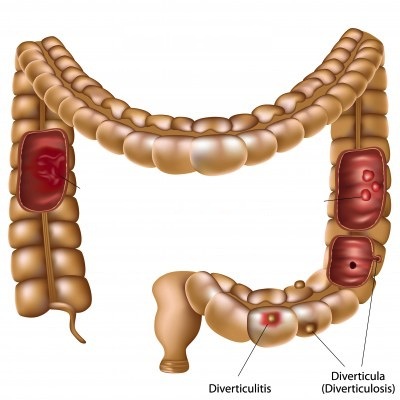Diverticulitis occurs when one or more diverticula- small, bulging pouches that form in the digestive tract- become inflamed or infected. Diverticula can form anywhere in the digestive system, from the esophagus to the small intestine, but are most commonly found in the large intestine. They usually develop in naturally weak places in the large intestine that eventually give way under pressure, causing marble-sized pouches to protrude through the colon wall. Diverticula are common, especially after the age of 40, though a person may not ever know they have these pouches because they seldom cause problems.
Sometimes, however, the pouches become inflamed or infected, and diverticulitis occurs. When this happens, it commonly causes symptoms of severe pain in the lower left side of the abdomen, abdominal tenderness, fever, nausea and vomiting, constipation, and diarrhea. Exactly how diverticula become inflamed or infected isn’t understood but factors that increase the risk include age (it is most common after the age of 40), a low-fiber diet, lack of exercise, and obesity.
Mild cases of diverticulitis are typically treated with rest, antibiotics, and a liquid or low fiber diet for a few days until symptoms improve and the infection heals. Pain medication may also be prescribed if the pain is moderate or severe. Surgery may be recommended for more serious cases of diverticulitis to remove the diseased part of the colon.
Acupuncture and Chinese medicine (TCM) can be an effective option for diverticulitis. Like other digestive disorders, diverticulitis is an inflammatory condition and acupuncture can help to relieve inflammation and strengthen the digestive system to promote proper functioning. In TCM, diverticulitis is classified as a type of abdominal pain because this is the main presenting symptom with the condition. It can develop as a result of our environment, such as cold or dampness, our diet, or emotional stress, which over time, combined with a person’s constitution (genetics), can make the body prone to digestive disorders.
Diagnosis is further made according to the nature of the pain, how it reacts to pressure, food or drink, activity/rest, heat, and bowel movements. This information can point an acupuncturist more specifically towards what is going on inside the body to cause the disorder, in order to target this imbalance in treatment and resolve the condition. There are actually 6 different types of abdominal pain in TCM that could lead to diverticulitis, and by understanding very specifically the cause of the condition, which can vary from person to person, we can very effectively focus on resolving the imbalance. With acupuncture we can relieve the symptoms of diverticulitis such as inflammation, pain, bloating, nausea, diarrhea and constipation. Acupuncture can also help to strengthen the immune system and the digestive system to ensure that both are functioning properly in order to resolve the condition and prevent future flare-ups from occurring.
Of course, with a digestive disorder it is very important to support treatment with lifestyle changes, particularly diet. Diverticulitis can be prevented or improved through a high-fiber diet, regular exercise, and drinking plenty of fluids. In addition, avoiding food or drinks of a cold temperature, sour foods, and greasy foods can help to manage the symptoms and prevent flare-ups. Diverticulitis doesn’t mean a person has to suffer; with healthy habits, one can live a comfortable, symptom-free life.




